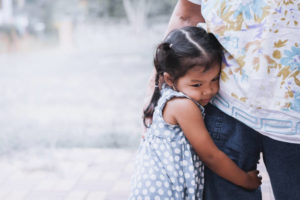Here is an article written by Tarynn Parry and Carole Cristiano about separation anxiety, as some parents prepare to say goodbye to their little ones for the very first time:

“We only part to meet again” – John Gay
Every parent dreads those teary, heart-wrenching goodbyes at kindergarten, daycare or even a friend’s house. Separation anxiety is a common reaction for children entering a new environment and can be distressing for both parent and child. There are a number of strategies that you can use to ease the transition.
Choose an appropriate time and talk about what will happen with your child in advance. If you anticipate a difficult goodbye, it is a good idea to practise the drop off. Show her where she will be going. Practise getting out of the car and walking to the entrance. Explain what will happen at goodbye time. Tell her what the day will look like. Whenever possible, arrange a few short visits in advance.
Establish a calm, consistent goodbye ritual. In this way, your child learns to anticipate and predict exactly what will take place every time he is dropped off. Give your child your full attention when you are saying goodbye. Avoid leaving your child when he is tired, sick or hungry. Tell him that you will be leaving and that you will be back. Because young children do not understand the concept of time, it is better to describe when you will be returning in their terms – after lunch, for instance, or circle time, or naptime, rather than giving them an exact time. Do exactly as you have said and return when you have promised.
Your actions and words should convey to your child your trust in the new setting and your confidence that she can handle it. Acknowledging her feelings: “I know you are sad, but I will be back soon. You can handle this”, is very reassuring. Saying goodbye with a smile on your face and leaving quickly also helps your child. Keep going even if your child is crying. By going back, you prolong the anguish. Sneaking out can lead to a loss of trust and increase a child’s anxiety.
Usually children adjust quickly to new situations and their anxiety lasts only a day, or at most, a week. Some children enter a new environment confidently in the early days but may experience reservations when they realize the situation is a permanent arrangement. This is also quite natural. If your child’s anxieties continue, and he is inconsolable, you should also look at whether the setting is right for your child. Trust your instincts.
And remember, your child’s reluctance to separate indicates that strong attachments have formed between the two of you. Before long, your child will remember that you always return, and knowing this will give him the confidence to say goodbye.


You must be logged in to post a comment.